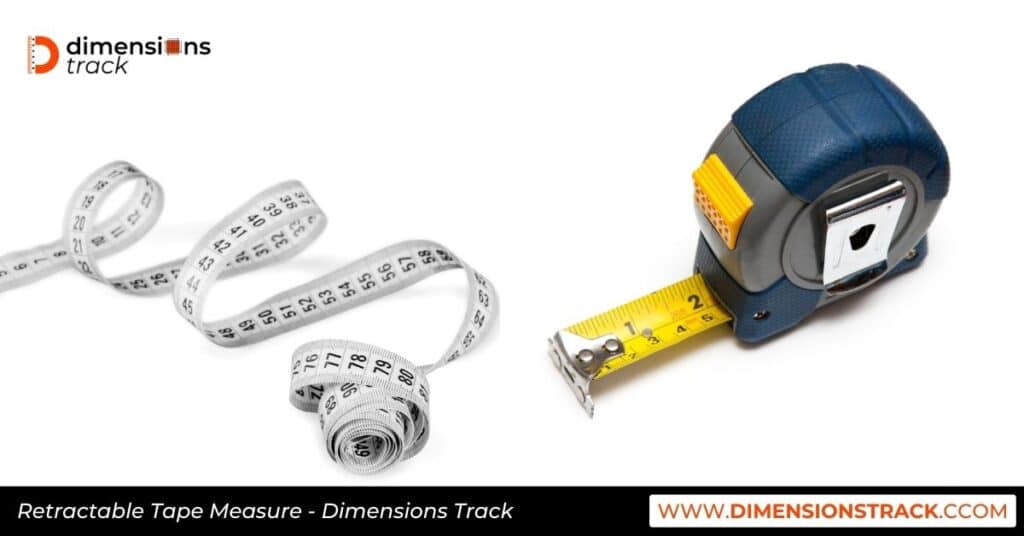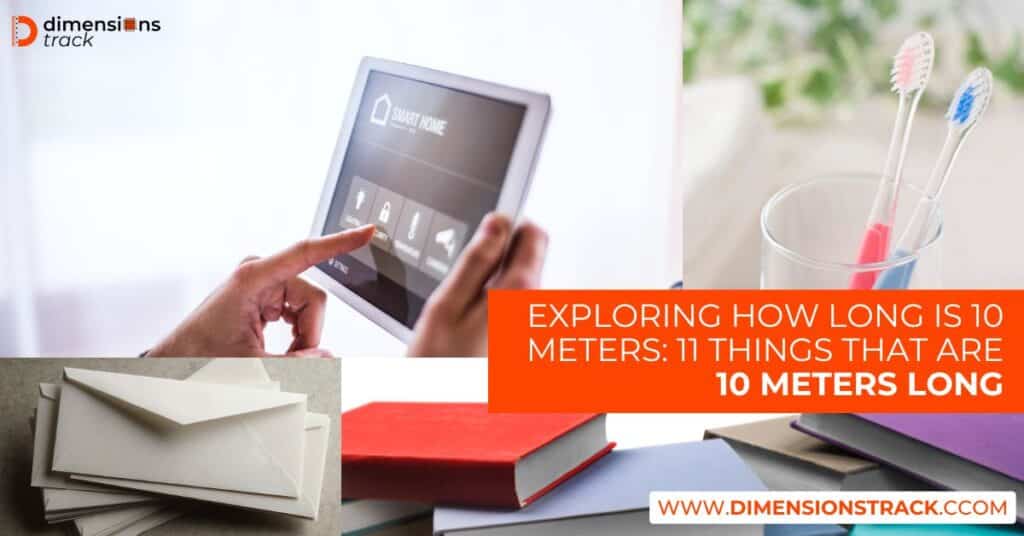Understanding the length of 10 meters can be quite fascinating, especially when we compare it to everyday objects and distances. Ten meters, equivalent to approximately 32.8 feet, is a measurement that can provide a clearer perspective when visualized through familiar items and distances.
In this article, we’ll explore various examples to give you a tangible sense of what 10 meters looks like, from buildings and human steps to common objects and landmarks. If you want to learn more about space measurements or are interested in how different lengths compare, these examples will give you a good idea of what ten meters mean.
How Long is 10 Meters Length?
Ten meters is a length that can be challenging to visualize without a frame of reference. As mentioned above, it’s equivalent to about 32.8 feet or just over 10 yards. This distance is slightly shorter than the length of a typical school bus and about the same as the height of a three-story building. Understanding this measurement through comparison helps make it more meaningful.
Imagine standing at one end of a swimming pool and looking across to the other; many standard swimming pools are about 25 meters long, so ten meters is just under half that distance. By picturing these familiar scenarios, you can start to grasp the substantial but manageable span that ten meters represents.
10-Meter Tall Building
A building that stands ten meters tall is roughly equivalent to a three-story structure. Each story in a building is typically around 3 to 3.5 meters high, including the space between floors, so three stories would bring the height to around 9 to 10.5 meters. Such a building might be a small apartment complex or an office building.
Although this building is tall enough to be seen in a small town or neighborhood, it is still not as big as the skyscrapers in big cities. Seeing a 10-meter-tall building can help you understand how far ten meters go up and down.
How Far is 10 Meters?
Ten meters is a distance that, while not extremely long, can be significant depending on the context. For example, in a sports arena, ten meters might be the distance from the free-throw line to the basketball hoop.
For outdoor activities, ten meters is about the distance of a short sprint, which is useful in various sports for quick dashes. If you were to lay out a 10-meter line, it would extend just over the width of a two-lane road. Understanding this distance helps visualize how far 10 meters can be in small and large spaces.
10 Meters Compared to the Human
When comparing 10 meters to the average human, the difference in scale becomes quite apparent. The average height of an adult human is around 1.7 meters (5 feet 7 inches). Therefore, ten meters is nearly six times the height of an average person. Imagine stacking six people, one on the other, to get an idea of this height.
This comparison helps highlight just how substantial ten meters is in everyday terms. Whether you’re visualizing someone standing next to a 10-meter structure or considering how far a person might walk in a few steps, this measurement becomes much more relatable.
11 Things That Are 10 Meters Long/Big
Here is the list of things that are 10 meters long:
1. Retractable Tape Measure

A retractable tape measure is a useful tool found in many homes and used by professionals in building, carpentry, and other fields. These tape measures can usually be stretched out up to ten meters, which makes them great for easily measuring long distances. If you fully extend a 10-meter tape measure, you can understand how long 10 meters is.
You could stretch the tape measure down a hallway, across a room, or even outside. This image can be very powerful, especially when you see how far it goes. It can also be used for home improvement projects, like figuring out how big a room is so you can buy new furniture or ensuring that yard elements are put in the right place.
“Measure with a micrometer, mark with chalk, and cut with an axe.” – Old Woodworking Proverb
2. 10 Adult Steps

The average adult step is about 0.8 to 1 meter (2.6 to 3.2 feet) long. Therefore, it would take approximately 8 to 10 adult steps to cover a distance of ten meters. This estimation can vary depending on the individual’s height and stride length, but it provides a practical and relatable way to measure distance without any tools.
Imagine walking across a park, a large room, or a short-track segment. Counting your steps as you go gives you a physical sense of how far ten meters extends. This method is particularly useful when formal measuring tools are unavailable in everyday situations.
Additionally, for fitness enthusiasts, understanding that 10 meters is roughly 8 to 10 steps can help in setting walking or running goals, making it easier to track progress over short distances.
| Person | Average Step Length | Steps to Cover 10 Meters |
|---|---|---|
| Adult (Male) | 0.8 – 1 meter | 10 – 12.5 steps |
| Adult (Female) | 0.6 – 0.8 meter | 12.5 – 16.7 steps |
| Child (10 years old) | 0.4 – 0.6 meter | 16.7 – 25 steps |
| Older Person | 0.5 – 0.7 meter | 14.3 – 20 steps |
3. Telephone Pole

A standard telephone pole stands about 30 to 60 feet tall. But common ones come between 30 to 36 feet long, making it a perfect example for visualizing this height. 32 feet is equal to 10 meters. These poles are ubiquitous in urban and rural landscapes, supporting wires that carry electricity and communication lines.
If you look up at a telephone pole, you can appreciate the vertical extent of ten meters. The next time you see a telephone pole, you can use it as a reference point for other objects or distances. The towering presence of these poles illustrates how tall 10 meters can be when viewed from the ground, offering a practical and easily observable example in everyday surroundings.
| Telephone Pole Height | Conversion to Meters | Notes |
|---|---|---|
| 30 Feet | 9.14 Meters | Shorter end of the typical range |
| 32 Feet | 9.75 Meters | Equivalent to 10 meters |
| 36 Feet | 10.97 Meters | Taller end of the typical range |
| 60 Feet | 18.29 Meters | Exceptionally tall telephone poles |
4. Half a Cricket Pitch

A cricket pitch is 22 yards long, which is approximately 20.12 meters. Therefore, half a cricket pitch is just over 10 meters. Visualizing half of a cricket pitch can provide a clear understanding of the distance. In cricket, the pitch is the central strip of the playing field, where the bowler delivers the ball to the batsman.
Standing at one end of the pitch and looking towards the middle, you can observe the length of 10 meters. For cricket enthusiasts and players, this comparison is particularly useful. It helps understand the scale of movements and actions during the game. For example, a fast bowler might take a run-up of around ten meters before delivering the ball.
Additionally, field placements and quick singles between the wickets involve covering this distance in a matter of seconds. If you’re a player, coach, or spectator, using the cricket pitch as a benchmark brings the measurement of ten meters into a familiar and engaging context.
5. Four and a Half times the Height of André the Giant
André the Giant, one of the most famous professional wrestlers and actors, stood at an impressive height of 2.20 meters (7 feet 4 inches). Comparing ten meters to André’s height provides a dramatic sense of scale.
At 2.20 meters tall, André the Giant was a towering figure, often described as a real-life giant. The length becomes even more significant when you consider that 10 meters is four and a half times his height.
For those familiar with André’s imposing stature, this comparison makes the abstract measurement of ten meters more concrete and relatable. It also highlights just how tall and remarkable André was in his prime. Also, his height offers a unique and memorable way to understand this distance.
6. ¼ the Length of Ha’Penny Bridge

The Ha’Penny Bridge, an iconic pedestrian bridge in Dublin, Ireland, spans 42.90 meters across the River Liffey. This beautiful cast-iron bridge, built in 1816, is a beloved landmark and a symbol of the city. One-quarter of its length is approximately 10.725 meters, giving an accurate sense of how big 10 meters is in the context of a well-known structure.
Walking across the Ha’Penny Bridge, you can observe its full span and imagine one-quarter of this distance. This example helps to put ten meters into a broader perspective, showing how it fits within the scale of architectural and historical landmarks. The bridge’s length can be visualized in segments, with each quarter representing the distance pedestrians travel daily.
For tourists and locals alike, relating ten meters to a portion of the Ha’Penny Bridge offers a meaningful and engaging way to conceptualize the measurement. It also highlights the bridge’s significance and how such distances play a role in navigating urban spaces.
7. A Bus

A standard city bus typically measures between 35 and 40 feet in length, which is approximately 10.7 to 12.2 meters. Consider the shorter end of this range to estimate 10 meters for simplicity. Buses are a common sight in urban areas, and their length can be an excellent example for understanding the length of ten meters.
You can recognize its length when you stand next to a city bus at a bus stop. Imagining a 10-meter distance can be as simple as visualizing the entire bus length or slightly less. If you’re waiting to board a bus, watching it navigate city streets, or seeing it parked, using its length as a comparison helps make the measurement of ten meters more relatable and realistic.
| Bus Type | Length (Feet) | Length (Meters) | Notes |
|---|---|---|---|
| Standard City Bus | 35 – 40 feet | 10.7 – 12.2 meters | Common urban bus size |
| School Bus | 34 – 40 feet | 10.4 – 12.2 meters | Slightly shorter than city buses |
| Articulated Bus | 55 – 60 feet | 16.8 – 18.3 meters | Longer “bendy” buses for high capacity |
| Double-Decker Bus | 36 – 45 feet | 11 – 13.7 meters | Taller and longer than standard buses |
8. Half a Bowling Lane
A standard bowling lane is 60 feet long, which is approximately 18.29 meters. Therefore, half of a bowling lane is 30 feet, or about 9.14 meters, which is close to ten meters. Picturing half a bowling lane can provide a clear sense of this distance.
Consider the length from the foul line to halfway down the lane when you’re at a bowling alley. This distance is just shy of ten meters, offering a clear and familiar reference point.
Even if you’re not a regular bowler, seeing the length of the lane about a ten-meter distance can be quite illuminating. It highlights how far 10 meters extend in a recreational setting, making it easier to comprehend this measurement through a practical example.
| Bowling Lane Measurement | Conversion to Meters | Notes |
|---|---|---|
| Full Lane Length | 18.29 Meters | Standard bowling lane length |
| Half Lane Length | 9.14 Meters | Approximately 10 meters |
| Foul Line to Halfway | 9.14 Meters | Common reference point in bowling |
| Foul Line to End | 18.29 Meters | Full length of the bowling lane |
9. Five times the Height of a Refrigerator

The average refrigerator stands about 5 to 6 feet tall, so five times this height equals approximately 10 meters. Imagine stacking five refrigerators on top of each other to reach this height.
Standing next to your refrigerator, you can look up and visualize multiplying its height by five. In a household setting, thinking about five stacked refrigerators provides a clear and impactful understanding of the length.
Not only that, but it also shows how long 10 meters is compared to normal things. This example is a great way to explain the idea of ten meters to kids or anyone who learns best by seeing things in real life.
10. Three-story Building

A three-story building typically measures around 10 meters tall, making it a perfect example for visualizing this length. Each story in a building generally stands at 10 feet high, including the space between floors, which totals about 30 feet for three stories. And 30 feet is slightly less than the ten meters.
Visualizing a 3-story building helps to put the vertical distance of ten meters into perspective. Whether it’s a small apartment building, an office structure, or a commercial property, these buildings are common in urban and suburban areas.
When you stand at the base of such a building and look up, the height gives you a sense of what 10 meters look like. The next time you pass by a three-story building, take a moment to appreciate its height and how it embodies the span of ten meters, making the abstract measurement more concrete and relatable.
11. Olympic Swimming Pool Lane

An Olympic-size swimming pool is typically 50 meters in length. Therefore, each individual lane within the pool is 10 meters long.
When you’re at an Olympic-style swimming competition, standing on the pool deck and looking down the length of the pool, you can get a tangible sense of what 10 meters looks like. Seeing the parallel lanes, each stretching 10 meters from one end to the other, provides a clear visual reference for this measurement.
For swimmers and aquatics enthusiasts, this comparison is especially meaningful. Knowing that an Olympic lane is 10 meters long helps put their training and performance into perspective. It allows them to better visualize the distances they cover during their laps and sprints.
Even if you’re not a competitive swimmer, observing the scale of an Olympic pool can give you a new appreciation for the length of 10 meters. It’s a relatable example that highlights how this measurement manifests in a real-world, athletic setting.
Fun Fact: The world’s deepest swimming pool is located in Poland and has a depth of 45.5 meters (149 feet), which is over 4 times the height of a 10-meter tall building.
Final Thoughts
Comparing the 10-metre scale to everyday items and distances you’re used to can be a fun and educational activity. Here are some comparisons that make the number ten meters more concrete:
- The height of a three-story building
- The length of half a cricket pitch
- The total height of several refrigerators
These examples help you picture a number in a real way, whether you’re thinking of the huge height of André the Giant repeated or the length of a fully extended tape measure. Knowing these distances makes us more aware of our surroundings and makes us appreciate the measurements we use daily.

Henry Martin is a dedicated author at Dimensions Track, specializing in creating informative guides on the dimensions and measurements of various objects. With a passion for providing precise and reliable information, Henry helps readers make well-informed decisions about everyday products and spaces. His attention to detail ensures that each guide is thorough, easy to understand, and packed with useful insights for anyone seeking accurate measurements.







